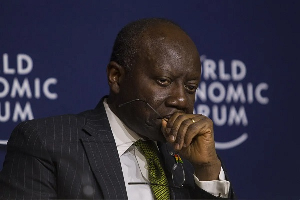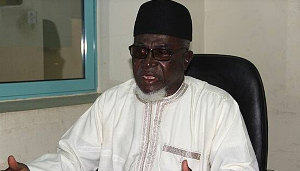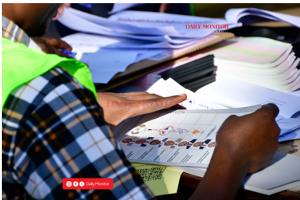By Dr. Michael J.K. Bokor
E-mail: mjbokor@yahoo.com
October 21, 2009 It appears that under this “new” NDC government, no day passes by without anything strange happening to dampen people’s spirits. Too much water is passing under the bridge while those in officialdom appear not to know what to do to coordinate activities in a manner that will prevent the erosion of public confidence in government’s handling of critical national issues.
Every day comes with its hot potato and the government appears to be interested in only shifting skeletons from one grave to the other. Conflicting reports concerning the fuel problem, public perception of government functionaries as incompetent, allegations of corruption in high places, the nauseating intrusion of the Nigerian Prophet T.B. Joshua into Ghana’s much-loved soccer scene, and many more appear to be the tip of the iceberg. What at all is happening? Then, as if what has happened so far isn’t enough irritation for Ghanaians, something heart-rending appears to be emerging from the quarters of the National Service Secretariat. It is a case of madness of monumental proportions: “National Service personnel will soon be posted into farming communities to work as farm hands.”
This news report (Reference JoyFm Online, October 21, 2009), attributed to the Executive Director of the National Service Secretariat (Vincent Kuagbenu), is a clear demonstration of the madness that has engulfed government business at all levels for some time now.
Here is Kuagbenu’s reasoning: “As I speak to you now we are acquiring about 20 hectares of land at Ejura and next year we are going into crop production. We must expand our facilities. We shouldn’t be importing food when we have an army of youth. Who should go into food crop production?” he quizzed, and expressed regrets over reports of service personnel “loitering” in offices because they have little or nothing to do.
Somebody has to stop this madness before it festers into something more ominous than our youths can contend with. It is a hot button that the management of the National Service Scheme wants to press. And it will definitely trigger unpleasant moments.
Is this assignment within the purview of the National Service Scheme? Do our communities not have more pressing needs for the energies of our national service personnel to be tapped for addressing than this madness on the farms? What has become of the military training that has been given to some of them over the years? With all that training what significant national assignment have they been used to tackle? I don’t want to assume that these beneficiaries of the military service have all been absorbed into the security services or given assignments that profit from that training. Let’s remember that the training was given at much cost to the country’s coffers. If for nothing at all, logistics were spent on their training!
I will be the first to support the use of our national service personnel in national development efforts if there is enough justification for it; but this “walantu walansa” business is misplaced. In the first place, is sending our graduates to that 20-hectare farm the solution to the unemployment problem facing them? Secondly, the intended measure appears to be more of a punishment than anything else. What right does the National Service Secretariat have to impose this forced labor on these youths on farms at Ejura?
Granted that the authorities want to instill in the youths the love for farming, there are better measures to take than this forced labor. A cursory glance into the past should give us some insights into the implications of this intended measure. These implications should either make people like Kuagbenu and those supporting him shudder or hesitate before taking any step that would definitely have a boomerang effect.
Similar efforts made by previous governments had their unfortunate sequel. Take, for instance, the late General I.K. Acheampong’s “Operation Feed Yourself,” which resulted in the cultivation of vast lands in the Dawhenya area for the production of tomatoes and rice.
Even though this agricultural venture appeared to have been wholeheartedly welcomed by Ghanaians, it didn’t last. There were allegations that the farms were, indeed, owned by the very military officers who led that “Operation Feed Yourself” efforts and appropriated proceeds from the sale of the produce. Eventually, the farms ended up being neglected when the “Operation” collapsed. Indeed, it was a nine day’s wonder that turned out to torment the very people who were lured into participating in it!
Then, in 1979 and early 1980s, the Jerry Rawlings’ era saw the deep involvement of students from the country’s universities in the “Students’ Task Force” that rehabilitated the country’s railway lines and evacuated locked-up cocoa to the ports. These students volunteered to do so, leaving the classrooms and responding enthusiastically to Rawlings’ clarion call to join the struggle for national renewal. What happened thereafter can be better retold by the participants themselves.
One thing is clear, though. The participation of students in General Acheampong’s and Rawlings’ projects was a voluntary one. No one imposed anything on the students. In this intended measure of the National Service Directorate, however, the situation is different. It is an imposition, which appears not to have been thought of properly. Somebody’s head appears to be in the clouds on this matter.
At least, placed within the larger national context—and considering the dire circumstances under which the students function in the various institutions—one doesn’t need any divination to know that whoever dreamt of this “walantu walansa” project for the graduates is a trouble-maker. How does one expect the graduates to reconnect with the reality of their career aspirations after this diversionary movement into what they haven’t prepared themselves for? What criteria will be used to determine who goes to the farms? What will the National Service Directorate do if the service personnel refuse to go there to work as farm hands?
I want Kuagbenu to ask Jerry Rawlings and all those ex-PNDC functionaries what happened to the Castle Farms in the Kasoa area that they had tilled in the early days of the PNDC and received much publicity on. Then again, I want him to find out from the Directorate of the Ghana Prison Service what has become of their farm projects in the Central Region and elsewhere. The fact is that such so-called agricultural ventures collapsed because they were initiated as spur-of-the-moment efforts.
There is no shred of doubt in my mind that our youths need employment; but they don’t need this kind of impulsive job avenue that will send them on a fool’s errand and not anything beneficial or sustainable for national growth. What is the NDC government’s program for agriculture (food production), generally? I don’t see anything encouraging from the government to warrant this imposition of forced labor on our graduates. Trust me, this measure will not succeed in getting them to the farms. In effect, it will give them wings with which to fly out of the country or instill in them the venom that will paralyze government at election time!!
If it is farm-hands that Ghana needs, there are a lot of youths already in the system. These might not have spent so much money and energy getting the kind of education that the graduates have. These youths are roaming the streets either selling dog-chains, shining shoes, or just lazing about because they have become what the Soviets would call “the lumpen proletariat.”
Others have turned themselves into trouble makers in many parts of the country because they cannot get any meaningful work to do. Being idle, the devil always finds work for them and they do it with careless abandon; hence, the spate of armed robbery and other social vices that have plagued the Ghanaian society and made life unbearable for law-abiding citizens. What is the government’s policy for these marauding unemployed youths? Are they not better positioned for use in any meaningful project?
The measure that the National Service Directorate intends to implement is bogus and must not be supported in any way. Government must take immediate steps to curtail this wantonness before it degenerates into more problems for it. It is disturbing that in our part of the world, people in positions of trust often turn out to be the problems that the society has to solve. This Kuagbenu is one such problem. Never in the history of the National Service Scheme has the institution been troubled as is happening in his tenure.
Already, there are indications that the National Service Scheme is out of focus because of recent labour-oriented problems that this Kuagbenu is alleged to have caused. His autocratic approach to administration is tearing the National Service Secretariat apart and if what he has announced is allowed to take roots, it will lead to nothing but total disaster.
All said, is he claiming that sending these university graduates and products of other educational institutions into the farmlands is a good way to prepare them for their future careers? Can’t Ghana benefit from the talents of these graduates in better ways than this ill-thought-of farming business?
Considering the likelihood that national service personnel themselves will not take kindly to this decision to send them into the “bush” as farmhands, I can only guess a bleak future for the entire National Service Scheme itself. I hesitate to say it; but the fact seems to rear its head. Those with discerning minds can tell that what this Kuagbenu intends to enforce will throw the entire National Service Scheme into disarray. He must be stopped in his stride before he creates more headache for the government, in particular, and the country, generally. Our plates are already full of trouble. This “walantu walansa” madness must be stopped immediately.
Opinions of Friday, 23 October 2009
Columnist: Bokor, Michael J. K.














